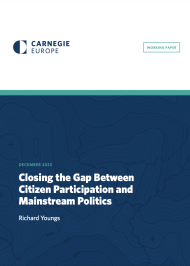
Over the last several years, citizen assemblies, juries, and panels have spread across Europe. Most of these have been run at the local or subnational level, a few at the national or even transnational level. Most have been called by public authorities, a smaller number created in more bottom-up fashion by civic groups. They all share a distinguishing feature: citizens are randomly selected to participate in debates about specific policies. In aggregate, these initiatives can be referred to as selection- or sortition-based participation.
As this wave of sortition-based participation consolidates, attention has turned to its wider political effects. While there is generally much to celebrate about this rise in participation, there remains a widespread feeling that the practice is not yet strongly enough embedded in mainstream politics to move the needle on overall democratic quality. Indeed, experiences suggest that standard channels of decisionmaking and political debate often undercut the influence of sortition initiatives.
This paper examines how sortition-based deliberation might be embedded more firmly and effectively within other democratic arenas. Its focus is not on the design and process of sortition forums themselves—many other publications have offered this level of evaluation in recent years.1 Rather, it explores options for building sortition-based forms of participation more fully into longer-standing channels of mainstream politics. If selection-based citizen participation is to have wider relevance to democratic renewal, it is important to identify the political factors that can either stifle or oxygenate its potential. This paper assesses what steps might be taken better to prevent politics from pushing sortition-based participation to the margins and what can be done to infuse politics more widely with the benefits of such participation.





